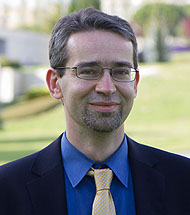2014_05_28_ICS_Ser ciudadano no consiste solo en votar a políticos, sino en orientar al bien común el conocimiento que cada uno domina
"Being a citizen is not only about voting for politicians, but also about orienting the knowledge that each one of us masters to the common good."
According to David Thunder, researcher of the ICS of the University of Navarra, anti-establishment parties have gained support in the European elections because they "question the project of the EU".

"Being a citizen is not only about electing political representatives, but also about exercising social responsibility. Everyone must contribute their own knowledge and experience in a way that has a positive impact for the common good." This is how David Thunder expressed himself, researcher of the Institute for Culture and Society (ICS) of the University of Navarra, on the occasion of the congress 'The Ethics of Citizenship in the 21st Century', which will be held on 30 and 31 May at the campus Pamplona.
The social order is so complex in today's world," he said, "that there is only one subject of citizenship, the specialized one. Everyone must choose his or her field of influence, whether it be ecology, providing keys for a sustainable development ; or business, governing the business with justice, offering quality jobs, providing services that increase common value...".
In that sense, Professor Thunder emphasized the danger of associating citizenship exclusively with the exercise of conventional politics: "That would imply that when you enter other spheres, such as the economic sphere, you can put aside your responsibility as a citizen, when that is not the case".
Morality in politics and paradigms of justiceOn the other hand, ICS's researcher insisted on the need to realistically adjust expectations towards politicians. "Instead of investing all our energy in creating an elitist policy that responds to our ideals, we should rethink the fundamentals. That does not mean denying conventional forms, but opening the door to others that we don't usually consider," he suggested.
Regarding the results of the recent European elections, he commented that "the people are telling politicians that they do not represent their interests. They feel increasingly alienated from the institutions and government of the European Union. In this status it is normal that the most anti-European and anti-establishment parties, which question the project of the EU as it is, are gaining more support".
For this Irish expert, the best way for citizens to regain their voice is to give less prominence to the European and national levels and delegate more to local institutions, "so that politics is more accessible and visible to them, they see the consequences directly and feel able to intervene".
David Thunder coordinates the congress 'The ethics of citizenship in the 21st century', organized by the project 'Religion and Civil Society' of the ICS. Some thirty experts from academic centers in the Netherlands, USA, Italy, New Zealand and Spain - two of them from Harvard University - will debate at the end of this week on the meaning and value of citizenship in a global world. They will address issues such as tolerance and the inclusion of diversity, morality in politics or paradigms of justice.
